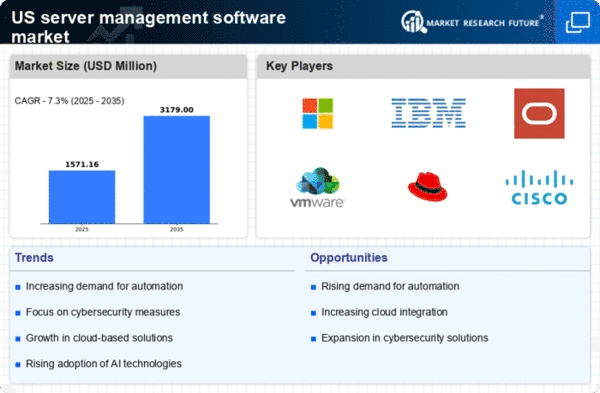Shift Towards Hybrid IT Environments
The server management-software market is witnessing a significant shift towards hybrid IT environments, where organizations combine on-premises infrastructure with cloud services. This hybrid approach allows businesses to leverage the benefits of both environments, such as scalability and cost-effectiveness. In 2025, it is projected that nearly 60% of enterprises in the US will adopt hybrid IT strategies. This shift necessitates advanced management solutions capable of seamlessly integrating and managing resources across both environments. As a result, the server management-software market is likely to expand, with vendors focusing on developing tools that provide visibility and control over hybrid infrastructures, thereby meeting the evolving needs of their clients.
Growing Complexity of IT Infrastructures
The server management-software market is significantly influenced by the increasing complexity of IT infrastructures. As organizations expand their operations, they often deploy a diverse array of servers, applications, and services. This complexity necessitates sophisticated management tools to ensure optimal performance and reliability. In 2025, it is estimated that over 70% of enterprises in the US will utilize multi-cloud environments, further complicating server management. Consequently, software solutions that can integrate and manage these diverse systems are in high demand. The server management-software market must adapt to these evolving needs, offering comprehensive solutions that simplify management tasks and enhance operational efficiency.
Rising Demand for Virtualization Solutions
The server management-software market experiences a notable surge in demand for virtualization solutions. As organizations increasingly adopt virtualization technologies, the need for effective management software becomes paramount. Virtualization allows multiple virtual servers to run on a single physical server, optimizing resource utilization and reducing costs. In 2025, the market for virtualization software is projected to reach approximately $10 billion in the US, indicating a robust growth trajectory. This trend compels software providers to enhance their offerings, ensuring compatibility and efficiency in managing virtual environments. Consequently, the server management-software market is likely to expand as businesses seek solutions that facilitate seamless virtualization management, thereby driving innovation and competition among vendors.
Increased Focus on Performance Optimization
The server management-software market is increasingly characterized by a heightened focus on performance optimization. Organizations are continually seeking ways to enhance the efficiency and speed of their server operations. In 2025, it is estimated that performance-related investments will constitute around 20% of total IT spending in the US. This trend drives the demand for software solutions that offer advanced monitoring, analytics, and optimization features. As businesses strive to improve their operational performance, the server management-software market is likely to see a surge in innovative solutions designed to maximize server efficiency and minimize downtime, thereby fostering a competitive landscape among software providers.
Emphasis on Compliance and Regulatory Standards
The server management-software market is increasingly shaped by the emphasis on compliance and regulatory standards. Organizations are under constant pressure to adhere to various regulations, such as GDPR and HIPAA, which mandate stringent data protection measures. In 2025, it is anticipated that compliance-related expenditures will account for approximately 15% of IT budgets in the US. This trend drives the demand for server management software that includes features for monitoring, reporting, and ensuring compliance. As businesses prioritize regulatory adherence, the server management-software market is likely to see a rise in solutions that facilitate compliance management, thereby enhancing their appeal to potential customers.
















